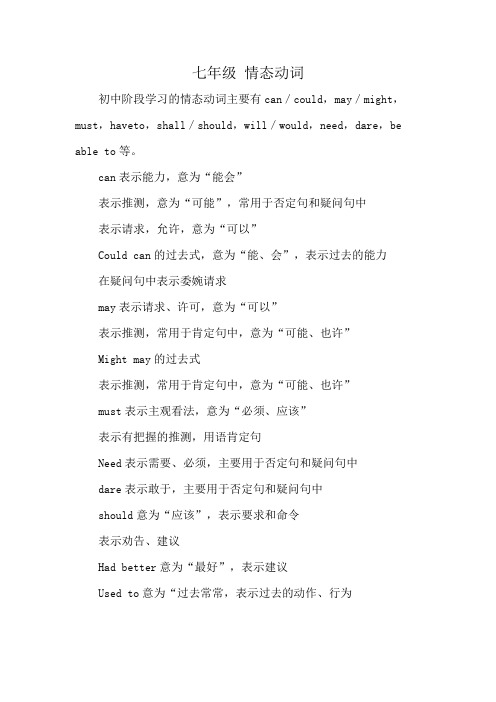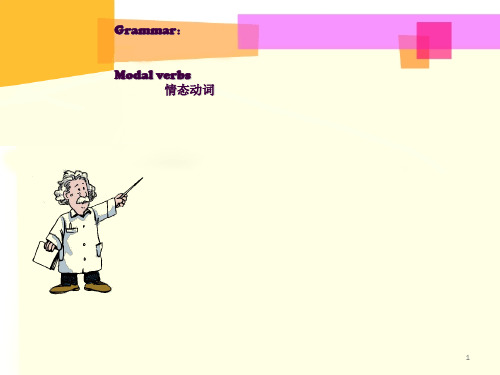初中语法之情态动词.ppt
合集下载
情态动词(20张PPT)初中英语专项复习课件

看法。
(1)只作情态动词:must;can/could;may/might;ought to
(2)既可作情态动词又可作实义动词:need,dare
((34))既 具可 有作 情情 态态 动动词词某又些可特作征稿稿定助:定hPa动PPvTP,e词T/海h:量asd素ha材tlo持l;/s续hha更odublde;twteirll/would
【知识拓展】
1. must的一般疑问句,肯定回答为Yes, ...must.;否定回答为No, ...needn’t./No, ...don’t have
to.—Must I clean the classroom now? 我必须现在打扫教室吗?
—Yes, you must. 是的,你必须。/No, you don’t have to. /No, you needn’t. 不,你不必。
He promised he would never smoke again. 他承诺他再也不吸烟了。
Their English teacher would tell them stories in
表示过去反复发生的动 English after class.
作或某种倾向
他们的英语老师总是在课后用英语给他们讲故事
新,上千款模板选择总有一
款适合你
知识点二:情态动词的特点
情态动词的特点: (1)情态动词无人称和数的变化(have to除外); (2)情态动词后接动词原形; (3)情态动词的否定式是在其后加not; have to除外 (4)具有助动词的作用,可用来构成否定句、疑问句及用于简明答语; (5)个别情态动词有现在式和稿过定去PP式T两种形式,过去式用来表达更加客气、委 婉的语气,时态性不强,可稿用定于PPT过,海去量、素材现持在续更或将来。
(1)只作情态动词:must;can/could;may/might;ought to
(2)既可作情态动词又可作实义动词:need,dare
((34))既 具可 有作 情情 态态 动动词词某又些可特作征稿稿定助:定hPa动PPvTP,e词T/海h:量asd素ha材tlo持l;/s续hha更odublde;twteirll/would
【知识拓展】
1. must的一般疑问句,肯定回答为Yes, ...must.;否定回答为No, ...needn’t./No, ...don’t have
to.—Must I clean the classroom now? 我必须现在打扫教室吗?
—Yes, you must. 是的,你必须。/No, you don’t have to. /No, you needn’t. 不,你不必。
He promised he would never smoke again. 他承诺他再也不吸烟了。
Their English teacher would tell them stories in
表示过去反复发生的动 English after class.
作或某种倾向
他们的英语老师总是在课后用英语给他们讲故事
新,上千款模板选择总有一
款适合你
知识点二:情态动词的特点
情态动词的特点: (1)情态动词无人称和数的变化(have to除外); (2)情态动词后接动词原形; (3)情态动词的否定式是在其后加not; have to除外 (4)具有助动词的作用,可用来构成否定句、疑问句及用于简明答语; (5)个别情态动词有现在式和稿过定去PP式T两种形式,过去式用来表达更加客气、委 婉的语气,时态性不强,可稿用定于PPT过,海去量、素材现持在续更或将来。
情态动词全部ppt课件

16
Some festivals are held to satisfy the ancestors, who might return either to help or to do harm.
推测
17
--- Excuse me. Is this the right way to the Summer Palace?
3. will/would
1. 表示意愿,will表示现在的意愿, would表示过去的意愿。
I will stick to my plan though all of you are against it.
I told him to give up smoking, but he wouldn’t
3. During the vacation, he would visit me
every four days.
过去的习惯
4. Will / Would you pass me the ball,
please?
请求
习惯,倾向 5. Birds will fly to the south in the winter. 24
You can go with them if you like.
--- Could/Can I have a look at your new design? --- Yes, of course you can.
(注意此处答语不能用could)
8
3)用在肯定句中,表示_客__观__上__有__可_ 能 Anybody can make mistakes. Driving on the snowy roads can be very dangerous.
Some festivals are held to satisfy the ancestors, who might return either to help or to do harm.
推测
17
--- Excuse me. Is this the right way to the Summer Palace?
3. will/would
1. 表示意愿,will表示现在的意愿, would表示过去的意愿。
I will stick to my plan though all of you are against it.
I told him to give up smoking, but he wouldn’t
3. During the vacation, he would visit me
every four days.
过去的习惯
4. Will / Would you pass me the ball,
please?
请求
习惯,倾向 5. Birds will fly to the south in the winter. 24
You can go with them if you like.
--- Could/Can I have a look at your new design? --- Yes, of course you can.
(注意此处答语不能用could)
8
3)用在肯定句中,表示_客__观__上__有__可_ 能 Anybody can make mistakes. Driving on the snowy roads can be very dangerous.
情态动词(17张PPT)初中英语专项复习课件

情态动词表推测也是每年中考的重点,以考查can’t 和must为主,主要在单项选择中考查不同情态动词的辨 析。考生在解答此类试题时,可以从以下几方面着手: ①表示否定的推测:一是断然的否定,此类题一般是考 查情态动词表推测的用法,语境会对所填空给出解释, 据 此 可 以 判 断 是 非 常 肯 定 的 否 定 , 此 时 最 好 用 cannot /can’t;二是表示不能十分肯定或拿不准,此类题一般 也会有相关的语境提示,如I’m not sure、who knows等 ,此时最好用may或might。
表示需要、必须,主 要用于否定句和疑问 句中。needn’t常用 于回答must表请求的 否定回答
—Must I finish my homework now?我必 须现在完成我的家庭作 业吗? —No, you needn’t. 不, 你不需要。
注意 (1) must和have/has to均意为“必须”,常可互 换使用。但have/has to是用于强调客观需要,意为 “必须, 不得不”;must用于表示主观看法, 意为“ 必须, 应该”。如:We’ll have to ask Zhang Hong. 我们必须去问张红了。 We must work hard at school. 在学校我们必须 努力学习。
情态动词本身有一定的意义,但不能独立作谓语, 没有人称和数的变化,后面必须接动词原形。常见的情 态动词有:may, must, need, have to 等,具体用法见下表 :
情态动词
用法
例句
表示能力,意为 Sam can speak English well.
can “能,会”
山姆英语讲得很好。
He could have gone home. 他可能已回家了。
表示需要、必须,主 要用于否定句和疑问 句中。needn’t常用 于回答must表请求的 否定回答
—Must I finish my homework now?我必 须现在完成我的家庭作 业吗? —No, you needn’t. 不, 你不需要。
注意 (1) must和have/has to均意为“必须”,常可互 换使用。但have/has to是用于强调客观需要,意为 “必须, 不得不”;must用于表示主观看法, 意为“ 必须, 应该”。如:We’ll have to ask Zhang Hong. 我们必须去问张红了。 We must work hard at school. 在学校我们必须 努力学习。
情态动词本身有一定的意义,但不能独立作谓语, 没有人称和数的变化,后面必须接动词原形。常见的情 态动词有:may, must, need, have to 等,具体用法见下表 :
情态动词
用法
例句
表示能力,意为 Sam can speak English well.
can “能,会”
山姆英语讲得很好。
He could have gone home. 他可能已回家了。
初中英语 外研社八年级上语法知识点-情态动词(PPT26张)

A. might B. will C. can
D. should
C 5. You ______ return the book now. You can keep it till next week if you like.
I need buy a big house. He need drive me home.
Need I buy a big house ?
-- Yes, you must. -- No, you needn’t / don’t have to. (不必要)
11
② 实意动词 (need to do sth)
A. must B. would C. may 15
3. — Dad, may I watch TV?
— No. You _A_ finish your homework first.
A. must
B. can
C. may
4. — Bob, shall we go and meet our new
13
have to 表示客观因素 We are very glad at the party, but mother is ill, so we have to leave now .
must 表示主观ຫໍສະໝຸດ 素 We must study hard to find a good job for ourselves .
--- Yes, you must. --- No, you don't have to/ needn't.
7
1.--Must I come before eight o'clock?
D --No, you _______.”
D. should
C 5. You ______ return the book now. You can keep it till next week if you like.
I need buy a big house. He need drive me home.
Need I buy a big house ?
-- Yes, you must. -- No, you needn’t / don’t have to. (不必要)
11
② 实意动词 (need to do sth)
A. must B. would C. may 15
3. — Dad, may I watch TV?
— No. You _A_ finish your homework first.
A. must
B. can
C. may
4. — Bob, shall we go and meet our new
13
have to 表示客观因素 We are very glad at the party, but mother is ill, so we have to leave now .
must 表示主观ຫໍສະໝຸດ 素 We must study hard to find a good job for ourselves .
--- Yes, you must. --- No, you don't have to/ needn't.
7
1.--Must I come before eight o'clock?
D --No, you _______.”
初中英语语法 情态动词的基本用法课件 can和could

can 和 could
KNOWLEDGE OF GRAMMAR
情态动词表示说话者的情感、 态度和语气。它们本身有一 定的意义,但没有人称和数 的变化,不能单独作谓语。
Can/could的基本用法
表示可能性 表示能力 表示请求或允许 can的习惯用法
KNOWLEDGE OF GRAMMAR
1. 表示可能性
KNOWLEDGE OF GRAMMAR
Even experienced teachers can make mistakes. 即使有经验的老师也可能出错。
Jim can be very annoying. 吉姆有时候会很烦人。
KNOWLEDGE OF GRAMMAR
(3) can/could have done表示对过去发生的事情的推测。can have done主要用于疑问句和否定句中。
KNOWLEDGE OF GRAMMAR
Could he still be alive after all this time?
过了这么长时间,他还可能活着 吗? 表示推测时用于疑问句
KNOWLEDGE OF GRAMMAR
(2) can用于肯定句中时表示理论 上的可能性,即从理论上看有可 能,但实际未必会发生。有时指 一时的情况,常意为“有时会”。
Paul isn’t able to come because he is ill. 保罗不能来,因为他生病了。(用于一般现在时)
KNOWLEDGE OF GRAMMAR
I will be able to speak English.(✓) 我将会说英语。(用于一般将来时)
I will can speak English.(×) 我将会说英语。(can不能用于将来时)
KNOWLEDGE OF GRAMMAR
情态动词表示说话者的情感、 态度和语气。它们本身有一 定的意义,但没有人称和数 的变化,不能单独作谓语。
Can/could的基本用法
表示可能性 表示能力 表示请求或允许 can的习惯用法
KNOWLEDGE OF GRAMMAR
1. 表示可能性
KNOWLEDGE OF GRAMMAR
Even experienced teachers can make mistakes. 即使有经验的老师也可能出错。
Jim can be very annoying. 吉姆有时候会很烦人。
KNOWLEDGE OF GRAMMAR
(3) can/could have done表示对过去发生的事情的推测。can have done主要用于疑问句和否定句中。
KNOWLEDGE OF GRAMMAR
Could he still be alive after all this time?
过了这么长时间,他还可能活着 吗? 表示推测时用于疑问句
KNOWLEDGE OF GRAMMAR
(2) can用于肯定句中时表示理论 上的可能性,即从理论上看有可 能,但实际未必会发生。有时指 一时的情况,常意为“有时会”。
Paul isn’t able to come because he is ill. 保罗不能来,因为他生病了。(用于一般现在时)
KNOWLEDGE OF GRAMMAR
I will be able to speak English.(✓) 我将会说英语。(用于一般将来时)
I will can speak English.(×) 我将会说英语。(can不能用于将来时)
七年级 情态动词

七年级情态动词
初中阶段学习的情态动词主要有can/could,may/might,must,haveto,shall/should,will/would,need,dare,be able to等。
can表示能力,意为“能会”
表示推测,意为“可能”,常用于否定句和疑问句中
表示请求,允许,意为“可以”
Could can的过去式,意为“能、会”,表示过去的能力
在疑问句中表示委婉请求
may表示请求、许可,意为“可以”
表示推测,常用于肯定句中,意为“可能、也许”
Might may的过去式
表示推测,常用于肯定句中,意为“可能、也许”
must表示主观看法,意为“必须、应该”
表示有把握的推测,用语肯定句
Need表示需要、必须,主要用于否定句和疑问句中
dare表示敢于,主要用于否定句和疑问句中
should意为“应该”,表示要求和命令
表示劝告、建议
Had better意为“最好”,表示建议
Used to意为“过去常常,表示过去的动作、行为。
情态动词详解ppt课件

She could / was able to sing like an angel
when she was a child.
2021精选ppt
8
3. 表示过去的能力 (1)could , was/ were able to 表示过去 一般的能力,即不表示做与未做某事。
She could / was able to sing like an angel
He should be around sixty years old. 他可
能60岁上下。
It’s nearly seven o’clock. Jack should be here
at any moment. (表示确定或期待)
2021精选ppt
15
4)should 表示推测时,表示确定或可能有 的未来或期望,即合乎理想的情况或结果。
He may not have finished the work.
He might have caught a cold.
2021精选ppt
20
5. Might have done
表示“本来可能……”,但实际上没有发生 的事。
另外,还可以表示“本应该或可以做某 事,”,含有轻微的责备语气。
You should not have swum in that sea.
that.
2021精选ppt
22
7. Needn’t have done
表示“做了本来不必去做的事情”, 注意:didn’t need to do 表示“没有必 要做而实际也免于做某事”。
You needn’t have taken a taxi here, for it was very near to my house.
when she was a child.
2021精选ppt
8
3. 表示过去的能力 (1)could , was/ were able to 表示过去 一般的能力,即不表示做与未做某事。
She could / was able to sing like an angel
He should be around sixty years old. 他可
能60岁上下。
It’s nearly seven o’clock. Jack should be here
at any moment. (表示确定或期待)
2021精选ppt
15
4)should 表示推测时,表示确定或可能有 的未来或期望,即合乎理想的情况或结果。
He may not have finished the work.
He might have caught a cold.
2021精选ppt
20
5. Might have done
表示“本来可能……”,但实际上没有发生 的事。
另外,还可以表示“本应该或可以做某 事,”,含有轻微的责备语气。
You should not have swum in that sea.
that.
2021精选ppt
22
7. Needn’t have done
表示“做了本来不必去做的事情”, 注意:didn’t need to do 表示“没有必 要做而实际也免于做某事”。
You needn’t have taken a taxi here, for it was very near to my house.
初中英语语法课件 几种情态动词的基本用法

Need I help you if you get into trouble?
EXERCISES
用适当的情态动词填空
needn’t
1. You
worry about me.
must 2. He looks so pale, he be ill.
3. Plants will die without sunshine.
3.must
表示“必须; 应该” We must finish our homework everyday.
表示“一定”
The book must belong to Jim , there is his name on the cover.
表示“硬要;偏要”
If you must go home, at least call your mom.
7. Students D tell lies. A. may not B. must C. can D. mustn`t
1. You A fail in the exam without hard working. A. will B. would C. mustn‘t D. can
2. He had to give up smoking because of his illness, C he? A. did B. does C. didn’t D. doesn‘t
2. may/might
表示请求、允许、许可, might比may的语气更委婉. 表示推测“可能”, could的可能性比can小。
—May I use the car ? —I’m afraid not. It might not be Jane. She hasn`t dicided to come here yet.
EXERCISES
用适当的情态动词填空
needn’t
1. You
worry about me.
must 2. He looks so pale, he be ill.
3. Plants will die without sunshine.
3.must
表示“必须; 应该” We must finish our homework everyday.
表示“一定”
The book must belong to Jim , there is his name on the cover.
表示“硬要;偏要”
If you must go home, at least call your mom.
7. Students D tell lies. A. may not B. must C. can D. mustn`t
1. You A fail in the exam without hard working. A. will B. would C. mustn‘t D. can
2. He had to give up smoking because of his illness, C he? A. did B. does C. didn’t D. doesn‘t
2. may/might
表示请求、允许、许可, might比may的语气更委婉. 表示推测“可能”, could的可能性比can小。
—May I use the car ? —I’m afraid not. It might not be Jane. She hasn`t dicided to come here yet.
情态动词初中英语

我能打台球
[kæ n] can modal 能够,可能
客观:打雷可能要下雨了
[kʊd] could modal 能够,可能
我能打台球
[kʊd] could modal 能够,可能
主观:我可能打的进去
[meɪ] may modal 可以,也许
你可以借这本书
[meɪ] may modal 可以,也许
情态动词 Modal
主语+
+ 冠词/数词+ 副词+ 形容词 + 名词
[mʌst] must modast modal 必须,一定
这些人一定犯了罪
[niːd] need modal &v.&n. 需要
老爷爷需要帮助
[kæ n] can modal 能够,可能
他也许是图书 管理员
[maɪt] might modal 可以,也许
你可以借这本书
[maɪt] might modal 可以,也许
你可以他借也这许本是书图书 管理员
[ʃæl] shall model 会
假如花缺水,我会给花浇水 当主语是I 和we 时候,过去的人用shall
[wɪl] will model 将会
假如花缺水,我会给花浇水
[wʊd] would model 将会
假如花缺水,我会给花浇水
[ʃud] should modal 应该
我应该把衣服晾在太阳下
初中英语语法-情态动词PPT课件

2021
10
四、 shall
1) shall 用于第一人称,征求对方的意见。 What shall we do this evening? shall I clean the room for you?
2021
11
2) shall 用于第二、三人称,表示说话人给对方的命令、警 告、允诺或威胁。
We should obey traffic laws. You shouldn‘t watch TV every day。 You shouldn’t have made this kind of silly mistakes. Tom should have brought his report today. 这时它可以和 ought to, be supposed to 互换使用
You can never imagine such a gentleman should be so rude to a lady.
2021
15
六: will 和would
1)表示意志或意愿:决心,愿意,…… We will do our best to save the child. 我们会尽力
I’ll not be able to come this afternoon. 当表示“经过努力才得以做成功某事”时应用be able to,
不能用Can。如:
He was able to go to the party yesterday evening in spite of the heavy rain.
Did anyone dare (to) admit it?有人敢于承认吗?
He did not dare (to) leave his car there. 他不 敢把车停放在那里。
情态动词表推测 初中九年级英语教学PPT课件 人教版

It can’t be John’s.
(一定不)
Because it’s much too small for him.
Can this T-shirt be John’s?
John
辩
Modal verbs possibilities meanings
must
肯定推测
might/could 肯定推测
A、must B、might/could C、can’t
结
modal verbs (情态动词)
must—一定 might/could—可能 can’t—一定不
-- It must be a traffic accident. Because we can see some traffic policemen.
must, might /could, can’t
modal verbs-情态动词 We can use modal verbs to talk about possibilities(可能性/推测).
情态动词表推测 —must, might/could,
can’t
- What happened to them?
-- It can’t be a good thing. Because they look sad.
-- It might/could be an accident. Because they are crying.
HOW
Whose notebook is this?
It must be Mary’s.
Mary
(一定)
It has her name on it.
Can you guess what is it?
初中英语语法大全——情态动词(共25张PPT)

三. must的用法
1.表示必须 must表示必须多指现在或将来的情况,强调说话者的主观语气即说话者认 为有必要或有义务做某事。对其一般疑问句的肯同答用must,否定回答用 needn't或者don't have to。 Everyone must take notes carefully in Professor Liu’s class. Must I finish the work tonight ? ---Yes, you must. --- No, you needn’t /don't have to.
九、had better的用法
1. 表示劝告或建议 eg: You' d better eat these bananas before they go ba d. 2. had better的否定形式 其否定形式是将not直接放在had better的后面。 eg: You had better not miss the last bus.
3.表示请求或允许 (1)用could 比用can更加迟疑不决,当没有把握得到允许或需 要委婉表达时用could。 eg: Could I take this seat, sir, if you don't mind? eg: You can phone me after six this afternoon. 当允许别人做某事时,答语用cause your cell phone for a while? --- Yes, of course you can.
五. will/would的用法
1、表示意愿 表示自愿做或主动提出做建电如意志 愿望或决心等,可用于各种 人称。would是will的过去式。 eg: I won’t argue with you.我不愿意和你争辩。 eg: Jane said she would not go with Tom, for she didn’t like him. 简说她不愿和汤姆一起去,因为她不喜欢他。
七年级英语情态动词课件

Policeman Postman
Waiter
Boss
No.1
No.2
No.3
He must be a ….
No.4
Where are they from?
No.1
No.2
No.3
No.4
He/She must be from/come from…
He/She may/might be from/come from…
do be doing have done
What are they doing? … must...
What is Ms Wang doing now?
The ground is wet. What happened last night?
It must have rained last night.
hear nothing. 4. We are students. We __m__u_st____
work hard. 5. ___M_a_y_____ I come in? 6. You __m_u_s_tn_’_t ___ talk in class.
•There must be some mistake. •She can’t be English. •Ask Jim. He may know the answer.
can? may? must? could? might ?Байду номын сангаас
1. Jim ___ca_n_____ sing very well. 2. Hello, c_an_/_c_ou_l_d_/m__ay_ I speak to Jim? 3. He listened, but he ___co_u_l_d____
初一情态动词语法讲解ppt课件

A. can
B. must
C. should
D. May
10.—May I smoke here?
--No, you __________ only do that in the smoking room.
A. can
B. can’t
C. must
D. mustn’t
13
否定回答:
就划线部分提问:Yes, he can.
No, he can’t.
What can your elder brother do?
8
Practice
2.You ______________m__a_y_ (可以) leave now. 否定句:
You may not leave now. 一般疑问句:
应该 意愿 敢 需要 不得不
+ 动词原形
3
肯定
can could may might must should
否定
can not could not may not might not must not should not
缩写否定
can’t couldn’t
/ mightn’t mustn’t shouldn’t
6.—Must I answer this question in English? --No, you _________.
A. mustn’t B. can’t
C. needn’t
D. shouldn’t
7.—Alice, please be quiet! The others __________ hear clearly.
Grammar: Modal verbs
情态动词
初中英语语法课件 情态动词need

否定句 needn’t+do He needn’t go.他不必走。
肯定句 need+主语+do…? Need he go so soon? 他这么快就要走吗?
need 引导的疑问句,肯定回答要用must。 —Need I hand it in right now? 我需要现在就交吗? —Yes, you must.是的,需要现在交。 —No, you needn’t.不,不需要现在交。
1 . 在 熊 猫 办 公 出 售 的 PPT 模 板是 免 版税 类 (R F : Ro yal ty-F re e )正 版 受《 中 国人 民 共 和国 著 作法 》 和《 世 界版 权 公约 》 的保 护 ,作 品 的 所 有 权 、 版 权 和 著 作权 归 熊猫 办 公所 有 ,您 下 载的 是 PPT 模 板素 材 的使 用 权。 2 . 不 得 将 熊 猫 办 公 的 PPT 模 板、 PPT 素 材 ,本 身 用于 再 出售 , 或者 出 租、 出 借、 转 让、 分 销、 发 布或 者 作为 礼 物供 他 人使 用 ,不 得 转授 权、出卖、转让本协议或者本协议中的权利。
1 . 在 熊 猫 办 公 出 售 的 PPT 模 板是 免 版税 类 (R F : Ro yal ty-F re e )正 版 受《 中 国人 民 共 和国 著 作法 》 和《 世 界版 权 公约 》 的保 护 ,作 品 的 所 有 权 、 版 权 和 著 作权 归 熊猫 办 公所 有 ,您 下 载的 是 PPT 模 板素 材 的使 用 权。 2 . 不 得 将 熊 猫 办 公 的 PPT 模 板、 PPT 素 材 ,本 身 用于 再 出售 , 或者 出 租、 出 借、 转 让、 分 销、 发 布或 者 作为 礼 物供 他 人使 用 ,不 得 转授 权、出卖、转让本协议或者本协议中的权利。
肯定句 need+主语+do…? Need he go so soon? 他这么快就要走吗?
need 引导的疑问句,肯定回答要用must。 —Need I hand it in right now? 我需要现在就交吗? —Yes, you must.是的,需要现在交。 —No, you needn’t.不,不需要现在交。
1 . 在 熊 猫 办 公 出 售 的 PPT 模 板是 免 版税 类 (R F : Ro yal ty-F re e )正 版 受《 中 国人 民 共 和国 著 作法 》 和《 世 界版 权 公约 》 的保 护 ,作 品 的 所 有 权 、 版 权 和 著 作权 归 熊猫 办 公所 有 ,您 下 载的 是 PPT 模 板素 材 的使 用 权。 2 . 不 得 将 熊 猫 办 公 的 PPT 模 板、 PPT 素 材 ,本 身 用于 再 出售 , 或者 出 租、 出 借、 转 让、 分 销、 发 布或 者 作为 礼 物供 他 人使 用 ,不 得 转授 权、出卖、转让本协议或者本协议中的权利。
1 . 在 熊 猫 办 公 出 售 的 PPT 模 板是 免 版税 类 (R F : Ro yal ty-F re e )正 版 受《 中 国人 民 共 和国 著 作法 》 和《 世 界版 权 公约 》 的保 护 ,作 品 的 所 有 权 、 版 权 和 著 作权 归 熊猫 办 公所 有 ,您 下 载的 是 PPT 模 板素 材 的使 用 权。 2 . 不 得 将 熊 猫 办 公 的 PPT 模 板、 PPT 素 材 ,本 身 用于 再 出售 , 或者 出 租、 出 借、 转 让、 分 销、 发 布或 者 作为 礼 物供 他 人使 用 ,不 得 转授 权、出卖、转让本协议或者本协议中的权利。
- 1、下载文档前请自行甄别文档内容的完整性,平台不提供额外的编辑、内容补充、找答案等附加服务。
- 2、"仅部分预览"的文档,不可在线预览部分如存在完整性等问题,可反馈申请退款(可完整预览的文档不适用该条件!)。
- 3、如文档侵犯您的权益,请联系客服反馈,我们会尽快为您处理(人工客服工作时间:9:00-18:30)。
“不肯定”的语气. • ③ could比can 语气更弱. • ④ can 不用于肯定句(除非是经验谈).
2. may, might
① may 表示 “允许” 或 “请求”. 在口语中可用can替代,但may比较正 式.
② 表示说话人的猜测,认为某一事情 “或许” 或 “可能” 发生.用might 指现3. 在m的us时t 候语气较为委婉客气或更加不肯定, might 还可表示 “规劝”.
四、情态动词的种类
要运用好情态动词,就要首先对情态动词有 一个完整的认识,情态动词分为三种情况: • 1. 只用作情态动词的有: must, can / could, may / might, ought to, be able to • 2. 既可作情态动词又可作实义动词的有: need, dare,have /had to, used to • 3. 既可作情态动词又为助动词的有: shall / should / will / would
A. dare walk
B. dare to walk
C. dares walking D. dares to walk
五、情态动词的词义及基本用法
1. can, could • ① 表示体力或脑力方面的 “能力”,或根据客观条件能做某种动作的 “能
力”. • ② 用于否定句或疑问句中表示说话人.对发生的事情的 “怀疑” “猜测”
A. won’t start B. wouldn’t start
C. doesn’t start D. didn’t start
4. (★★★★★) Better set off at once, ____B____?
A. won’t you B. shall we
C. hadn’t you D. wouldn’t you
三、否定式
•shall not — shan’t
的现在时也无变化.
•will not — won’t
2) 有些情态动词有过去式, 有的过去式和它的原 型相同.
a. 有过去式的有: b. 过去式不变的有:
•can not — can’t •must not — mustn’t
can — could
must — must (或had to)
情态动词
一、特征
1) 情态动词本身有词义,表示说话人的语气或情态,但词义不完全,不能单独作谓语动 词,只能和不带to的动词不定式(即动词原型)(ought等除外)一起构成谓语动词.
2) 情态动词所表示的情态有: 命令、允许、请求、拒绝、愿望、愿意、义务、必要、
可能、敢于、需要等. 二、形式变化 1) 情态动词没有人称和数的变化, 第三人称单数
well already.
A. don’t need; gets
B. needn’t; may have got
C. mustn’t; got
D. don’t need to; may get
3. (★★★★) I’ve tried many times, but the car just ____B____.
歼灭难点训练
1. (★★★★) Don’t lock the door in case he__B_____back late at
night.
A. should come B. might come
C. will come D. would come
2. (★★★★★) You_____B___ worry about the old man. He________
—I’m not sure. I Dgo to the concert instead. (2000年高考)
A. must B. would C. should D. might 7. (★★★★★) —Do you think he will do me a favour?
—As far as I know, he is the last one to help others.
C. didn’t D. haven’t
9. (★★★★★) It’s dark now. We have to stay here
for the night, ? A
A. don’t we B. haven’t we
C. mustn’t we D. shouldn’t we
10. (★★★★★)Байду номын сангаасHe D through the forest alone.
①表示 “必须” 或 “应当”. 其否定式表示 ‘不应该” 或 “不许可”, 语气 比较 强烈.
② 表示说话人对事物的推测, 意思为 “一定” 或 “准是”, 语气比may要强得 多 4. have to
① 表示 “不得不” “必须” 的概念, 比must更含有 “客观条件使得必须 如此做”, 并有较多的时态.
•should not — shouldn’t
may — might
ought to — ought to
•ought not to
will — would shall — should dare — dared need — needed have to — had to
•would not — wouldn’t •could not — couldn’t •dare not — daren’t •need not — needn’t
He B be prepared to give you a hand, though.
(南京二模)
A. might B. must C. can D. should
8. (★★★★★) You must have seen the film last
night, C you?
A. mustn’t B. isn’t
5. (★★★★★) I was really anxious about. You ____B____
home without a word. (2001年高考)
A. mustn’t leave B. shouldn’t have left
C. couldn’t have left D. needn’t leave 6. (★★★★★) —Are you coming to Jeff’s party?
2. may, might
① may 表示 “允许” 或 “请求”. 在口语中可用can替代,但may比较正 式.
② 表示说话人的猜测,认为某一事情 “或许” 或 “可能” 发生.用might 指现3. 在m的us时t 候语气较为委婉客气或更加不肯定, might 还可表示 “规劝”.
四、情态动词的种类
要运用好情态动词,就要首先对情态动词有 一个完整的认识,情态动词分为三种情况: • 1. 只用作情态动词的有: must, can / could, may / might, ought to, be able to • 2. 既可作情态动词又可作实义动词的有: need, dare,have /had to, used to • 3. 既可作情态动词又为助动词的有: shall / should / will / would
A. dare walk
B. dare to walk
C. dares walking D. dares to walk
五、情态动词的词义及基本用法
1. can, could • ① 表示体力或脑力方面的 “能力”,或根据客观条件能做某种动作的 “能
力”. • ② 用于否定句或疑问句中表示说话人.对发生的事情的 “怀疑” “猜测”
A. won’t start B. wouldn’t start
C. doesn’t start D. didn’t start
4. (★★★★★) Better set off at once, ____B____?
A. won’t you B. shall we
C. hadn’t you D. wouldn’t you
三、否定式
•shall not — shan’t
的现在时也无变化.
•will not — won’t
2) 有些情态动词有过去式, 有的过去式和它的原 型相同.
a. 有过去式的有: b. 过去式不变的有:
•can not — can’t •must not — mustn’t
can — could
must — must (或had to)
情态动词
一、特征
1) 情态动词本身有词义,表示说话人的语气或情态,但词义不完全,不能单独作谓语动 词,只能和不带to的动词不定式(即动词原型)(ought等除外)一起构成谓语动词.
2) 情态动词所表示的情态有: 命令、允许、请求、拒绝、愿望、愿意、义务、必要、
可能、敢于、需要等. 二、形式变化 1) 情态动词没有人称和数的变化, 第三人称单数
well already.
A. don’t need; gets
B. needn’t; may have got
C. mustn’t; got
D. don’t need to; may get
3. (★★★★) I’ve tried many times, but the car just ____B____.
歼灭难点训练
1. (★★★★) Don’t lock the door in case he__B_____back late at
night.
A. should come B. might come
C. will come D. would come
2. (★★★★★) You_____B___ worry about the old man. He________
—I’m not sure. I Dgo to the concert instead. (2000年高考)
A. must B. would C. should D. might 7. (★★★★★) —Do you think he will do me a favour?
—As far as I know, he is the last one to help others.
C. didn’t D. haven’t
9. (★★★★★) It’s dark now. We have to stay here
for the night, ? A
A. don’t we B. haven’t we
C. mustn’t we D. shouldn’t we
10. (★★★★★)Байду номын сангаасHe D through the forest alone.
①表示 “必须” 或 “应当”. 其否定式表示 ‘不应该” 或 “不许可”, 语气 比较 强烈.
② 表示说话人对事物的推测, 意思为 “一定” 或 “准是”, 语气比may要强得 多 4. have to
① 表示 “不得不” “必须” 的概念, 比must更含有 “客观条件使得必须 如此做”, 并有较多的时态.
•should not — shouldn’t
may — might
ought to — ought to
•ought not to
will — would shall — should dare — dared need — needed have to — had to
•would not — wouldn’t •could not — couldn’t •dare not — daren’t •need not — needn’t
He B be prepared to give you a hand, though.
(南京二模)
A. might B. must C. can D. should
8. (★★★★★) You must have seen the film last
night, C you?
A. mustn’t B. isn’t
5. (★★★★★) I was really anxious about. You ____B____
home without a word. (2001年高考)
A. mustn’t leave B. shouldn’t have left
C. couldn’t have left D. needn’t leave 6. (★★★★★) —Are you coming to Jeff’s party?
